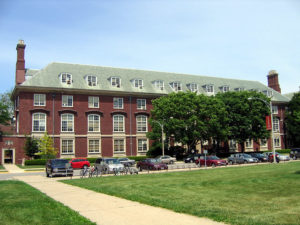‘Brief Histories of Inequality’: Student Debt Edition
Salon columnist Thomas Frank takes us from the start of the university "tuition spiral" in the early ’80s, past the refusal to note the role of ballooning administrative costs, and through the emergence of the view that as an investment in future earnings, individuals should shoulder whatever price for education the market sets.
In an installment of his “brief histories of inequality,” Salon columnist Thomas Frank takes us from the start of the university “tuition spiral” in the early ’80s, past the refusal to note the role of ballooning administrative costs, and through the emergence of the view that as an investment in future earnings, individuals should shoulder whatever price for education the market sets.
Scan a few of Frank’s excerpts before reading his essay in full:
The possibility that higher tuition prices were going to pay for rapidly multiplying and yet educationally unnecessary administrators was not really raised in earnest until a memorable page-one series published in 1996 by the Philadelphia Inquirer. This interpretation had the virtue of being accurate: Unlike tenured faculty, university administrations actually have grown by 369 percent since the mid-1970s. (As I have noted before.) But blaming administrators proved difficult for journalists, perhaps because administrators were the very people journalists had been going to for explanations in their tuition-outrage stories. Could their sources actually be the culprits? No way. And so, less than a year after the Inquirer’s series appeared, USA Today ran its own big tuition-shock tale in which the blame was pinned on all the familiar blame-objects: Professors, student demands, technology, gummint regulation. A 1997 cover story in Time magazine—“How Colleges Are Gouging U,” the illustration shouted—barely mentioned administrators at all.
… there should be no illusions. More information by itself is not going to stop the tuition spiral, not after 33 years. In fact, we can predict fairly easily how this thing will backfire once the government discovers and announces the precise “return on investment” for each institution of higher learning: Like any rational, profit-maximizing entity those institutions will simply continue hiking tuitions in order to capture a larger chunk of that return for themselves.
… Everyone in the age of inequality knows that the purpose of a college education isn’t to benefit the nation; it’s to give the private individual a shot at achieving a High Net Worth.
Agreeing upon that, everyone from state legislators to the Secretary of Education naturally began to ask, Why should I pay for someone else to get rich? Those people need to foot the bill themselves.
Agreeing upon that, the colleges and universities reconceived their mission and began to put a more accurate price tag on what the consensus now acknowledged that they were selling.
— Posted by Alexander Reed Kelly.
Your support matters…Independent journalism is under threat and overshadowed by heavily funded mainstream media.
You can help level the playing field. Become a member.
Your tax-deductible contribution keeps us digging beneath the headlines to give you thought-provoking, investigative reporting and analysis that unearths what's really happening- without compromise.
Give today to support our courageous, independent journalists.




You need to be a supporter to comment.
There are currently no responses to this article.
Be the first to respond.